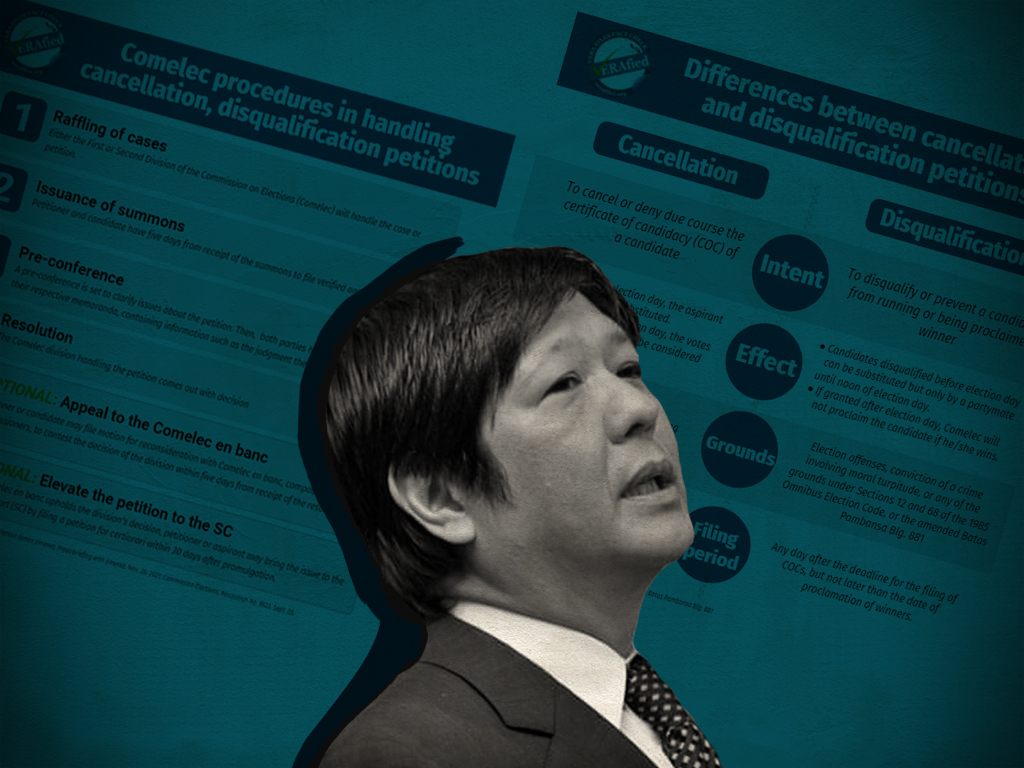Petitions vs Marcos Jr.: No fool’s errand
CHEERS TO VERA Files for directing public attention to the Commission on Elections’ (Comelec) procedures in resolving petitions to cancel an aspirant for public office’s candidacy or in disqualifying a candidate. Looking at four petitions, which either want to cancel the COC or disqualify outright presidential hopeful Ferdinand “Bongbong” Marcos Jr., the explainer is a guide for the media and the public to hold the Commission accountable in the event that it strays from its own rules.
VERA Files walked readers through the following points:
- The difference between a petition for disqualification and cancellation
- The procedures the petitions go through, including the alternative to the candidate once the petitions are resolved by the Comelec
- The effects of a granted petition
VERA Files included the following graphs in its report:
VERA Files pointed out that a granted petition’s consequences depend on the nature of the petition; and on whether it is the Comelec or the Supreme Court that is resolving it.
Disqualification allows substitution by a party mate. But cancelled COCs disallow any substitution. If, for instance, a petition to disqualify or cancel is still pending on the day of the election, a petitioner can file with the Comelec a motion, based on strong evidence, to suspend the candidate’s proclamation.
“A petition to disqualify granted after election day bars the proclamation of a winning candidate,” VERA Files added.
VERA Files noted that all four petitions against Marcos Jr. remain pending. (there were seven as of December 3, 2021).The explainer laid out the developments in the one filed by civic leaders Christian Buenafe and Fides Lim on November 2, which sought to cancel Marcos Jr.’s candidacy for failing to indicate in his COC his conviction for tax evasion in 1995.
The piece cited Theodore Te, lawyer of the petitioners, as cautioning the Comelec against flouting its own rules. Apparently, Marcos, Jr.,was clearly informed about the deadline for his reply, but he still failed to file his answer to the petition, and asked for an extension instead. Comelec Resolution No. 9523 states that the failure of any party to file a verified answer “within the reglementary period shall bar the respondent from submitting controverting evidence or filing his memorandum.” But the Comelec nevertheless granted Marcos’s request for an extension.
It should be noted that of all presidential aspirants for the 2022 elections, he is the only one facing multiple petitions against his candidacy. The media’s responsibility in this instance is clear. They must provide the kind of coverage that gets at the truth of these charges and what these charges say about the presidential candidate.
VERA Files called attention to the necessity of examining these petitions and the rules governing their resolution. Should Comelec fail to follow the rules, it is imperative that the media hold the Comelec accountable, and inform voters about Comelec’s failure to follow the rules it had set for this process.
Hopefully, journalists will be assisted by enough lawyers who will stand on the right side of the law and help the public understand the gravity of the charges faced by this presidential candidate. The media should also assess the capacity of the Comelec to protect the integrity and credibility of the elections in 2022.
The media should keep as close to these facts presented by Vera Files. But journalists should also prepare for the challenge posed by the kind of lawyering that Marcos Jr. has on hand, the legal luminaries who work through loopholes and technicalities to keep him and the Marcos family free of legal troubles. The culture of impunity depends on, among other factors, this kind of lawyering, which makes it possible for those with the means and the power to escape accountability and punishment.

Leave a Reply